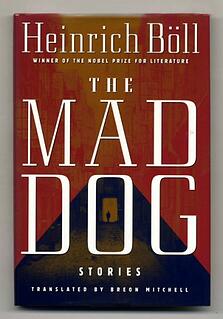As another anniversary of the 1944 allied landing at Normandy takes place this June, thousands of participants will trod the roads and fields once defended by Hitler’s Wehrmacht. One of the members of Wehrmacht was Heinrich Bӧll, a devout Catholic from Cologne and an eventual Nobel Prize in Literature winner in 1972.
 In the months beyond the landing, as many American forces discovered surviving Normandy meant Pacific redeployment for the invasion of Japan, Bӧll found defending the Wehrmacht retreat from Paris meant redeployment to the Russian front. By war’s end, he’d suffered four wounds, typhoid fever, and was living with his family in a destroyed house.
In the months beyond the landing, as many American forces discovered surviving Normandy meant Pacific redeployment for the invasion of Japan, Bӧll found defending the Wehrmacht retreat from Paris meant redeployment to the Russian front. By war’s end, he’d suffered four wounds, typhoid fever, and was living with his family in a destroyed house.
The Pictures of War Bӧll Framed
Many Normandy speeches this June may include George Santayana’s words from The Life of Reason: “Those who cannot remember the past are condemned to repeat it.”
Few that cite Santayana’s admonition will note the irony that almost no one alive today can possibly remember the Normandy past – because they never landed on the beaches or lived through the war. Fewer still will quote Santayana’s further observation in The Life of Reason: “History is nothing but assisted and recorded memory. The picture we frame of the past changes continually and grows every day less similar to the original experience…”

In The Mad Dog, a collection of Bӧll's short stories published posthumously, Heinrich Bӧll rises to the challenge to “frame the past” more, rather than “less similar to the original experience.” He does this in a series of ten short stories. They range from pre-war idealism in "Youth on Fire," written when Bӧll was only nineteen years old, to wartime nihilism in "The Mad Dog," and post-war disillusion and anguish in "Paradise Lost."
The Difference For Bӧll
The pictures of WWII framed by Bӧll are very different from those framed by contemporary author Stephan Ambrose in The Wild Blue. In "Youth on Fire," Bӧll depicts a pre-war German society corrupted beyond innocence and naiveté: “When the holy ceremony was completed, the young priest spoke. ‘It’s customary for the priest to say a few words to a young couple upon uniting them in holy matrimony. Please forgive me, but I can’t speak at the moment….We so seldom see true Christian feeling and humbleness before God these days.”

For Ambrose, loss of innocence was a wartime experience and more individual than cultural: “He was digging into the dirt with the stubs of his elbows, trying to survive. Right then and there, I realized how precious life is. He crawled right up to us, looked us straight in the eyes, and then closed his eyes forever.”
Of course, when Ambrose frames his pictures, he suffers under the same handicap faced by the readers of this post – he can’t remember a past he never experienced.
For that reason, Bӧll was able to infuse his WWII writings in The Mad Dog with an authenticity, power and vision beyond the reach of contemporary authors. By doing so, and particularly by providing a Wehrmacht perspective to non-German readers, Bӧll delivers a remarkable literary experience.
What We Can Learn From Bӧll Today
For example, Bӧll, in “Trapped in Paris,” frames a picture in which wartime loss of innocence is both deeply personal and profoundly cultural. The main character describes the act of discarding his German uniform while hiding from American soldiers, “It was a somber, terrible business, emptying the pockets of the miserable rags in the cellar, with their dangling, half-broken decorations. It seemed gruesome, like looting a corpse.”
Bӧll evidences in “The Mad Dog” how a powerful intellect, unleavened by even trace amounts of morality, unleashes its own destruction: “And his downfall was brought about by a woman. She incited the others, and they fell upon him with a fury more terrible than that reserved for the other victims, for it is a diabolical, profoundly shocking enigma that down deep, Hell hates nothing so much as itself.”
Perhaps Bӧll, if he could whisper in the ears of those speaking this June at Normandy, would point to the tongue-tied priest, as much as he would to the beaches of Normandy, as the picture of history from his lifetime that should not be repeated.









